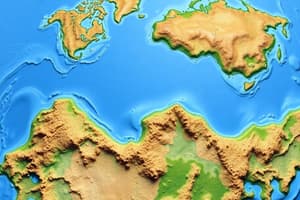Podcast
Questions and Answers
Which scale of geography focuses on specific localities like cities and neighborhoods?
Which scale of geography focuses on specific localities like cities and neighborhoods?
- Local scale (correct)
- National scale
- Regional scale
- Global scale
What is a primary goal of studying geography?
What is a primary goal of studying geography?
- To analyze the impact of human activities on the environment (correct)
- To exclusively focus on historical events
- To evaluate global business metrics
- To understand local sports events
Which example illustrates a regional-level investigation?
Which example illustrates a regional-level investigation?
- Evaluating neighborhood characteristics in a town
- Analyzing urban growth in a city
- Examining climate change on a global scale
- Studying migration patterns across countries (correct)
What characteristic is central to understanding spatial relationships in geography?
What characteristic is central to understanding spatial relationships in geography?
Which of the following topics would be studied at the global scale?
Which of the following topics would be studied at the global scale?
Which sub-discipline of physical geography focuses primarily on the study of landforms and their evolution?
Which sub-discipline of physical geography focuses primarily on the study of landforms and their evolution?
Which of the following best describes the concept of 'relative location'?
Which of the following best describes the concept of 'relative location'?
A region defined by a shared transportation or communication network, like a metropolitan area linked by highways, is best classified as what type of region?
A region defined by a shared transportation or communication network, like a metropolitan area linked by highways, is best classified as what type of region?
Which of the following is the BEST example of human-environment interaction?
Which of the following is the BEST example of human-environment interaction?
Which geographic tool is most suitable for representing the Earth's surface while maintaining accurate shapes and relative sizes of features?
Which geographic tool is most suitable for representing the Earth's surface while maintaining accurate shapes and relative sizes of features?
Which technology involves acquiring data about the Earth's surface without direct physical contact?
Which technology involves acquiring data about the Earth's surface without direct physical contact?
Which of the following is a primary focus of human geography?
Which of the following is a primary focus of human geography?
What is the primary function of Geographic Information Systems (GIS)?
What is the primary function of Geographic Information Systems (GIS)?
Flashcards
Global Scale
Global Scale
Refers to the study of large-scale issues like climate change and globalization.
Regional Scale
Regional Scale
Focuses on smaller areas such as continents, countries, or states to study economic development and migration.
Local Scale
Local Scale
Concentrates on specific localities like cities or neighborhoods, analyzing urban growth and local economies.
Importance of Geography
Importance of Geography
Signup and view all the flashcards
Sustainable Development
Sustainable Development
Signup and view all the flashcards
Physical Geography
Physical Geography
Signup and view all the flashcards
Human Geography
Human Geography
Signup and view all the flashcards
Location
Location
Signup and view all the flashcards
Region
Region
Signup and view all the flashcards
Movement
Movement
Signup and view all the flashcards
Geographic Information Systems (GIS)
Geographic Information Systems (GIS)
Signup and view all the flashcards
Remote Sensing
Remote Sensing
Signup and view all the flashcards
Fieldwork
Fieldwork
Signup and view all the flashcards
Study Notes
Branches of Geography
- Physical geography examines Earth's natural features, processes, and systems. Sub-disciplines include geomorphology (landforms), climatology (weather patterns), hydrology (water), and biogeography (life distribution).
- Human geography focuses on human activities, environmental interactions, settlement patterns, culture, and economies. Specializations include urban geography, population geography, economic geography, and political geography.
- Geographic Information Systems (GIS) collect, analyze, and visualize geographic data. GIS leverages spatial data (coordinates, locations) for mapping and explaining phenomena.
- Cartography is the art and science of mapmaking, involving map design, production, and interpretation.
Key Concepts in Geography
- Location: Describes a place's position on Earth's surface. Absolute location uses coordinates (latitude and longitude), while relative location describes position in relation to other places.
- Place: Unique characteristics of a location, encompassing physical features, human characteristics (culture), and perceived meanings.
- Region: Area defined by shared characteristics. Regions can be formal (official boundaries), functional (interaction), or perceptual (shared feelings/ideas).
- Movement: Flow of people, goods, ideas, and information between places. Geographical elements like transportation and communication influence movement and impact locations.
- Human-environment interaction: Examines how humans modify and are modified by their environment, from agriculture to urbanization to climate change impacts.
Essential Geographic Tools
- Maps: Representations of Earth's surface, displaying locations, distances, and relationships.
- Globes: Three-dimensional representations of Earth, accurately portraying shapes of features.
- Geographic Information Systems (GIS): Software and hardware for capturing, storing, analyzing, and visualizing geographic data.
- Remote sensing: Acquires data about Earth's surface from a distance, like satellite imagery for land cover change studies.
- Fieldwork: Direct observation for gathering data and information about a place.
Geographic Scales
- Global scale: Study of the entire Earth, focusing on issues such as global climate change and globalization.
- Regional scale: Examination of smaller regions (continents, countries, states), analyzing regional economic development and migration patterns.
- Local scale: Study of specific localities (cities, towns, neighborhoods), investigating urban growth, neighborhood characteristics, and local economies.
Importance of Geography
- Understanding global challenges (climate change, resource management, population growth, globalization).
- Assessing human activity impacts on the environment and resource distribution.
- Studying location and distribution of people, businesses, and industries.
- Analyzing human behavior patterns and societal interactions with the environment.
- Fostering sustainable development and responsible resource use.
- Understanding spatial relationships and patterns to support problem-solving and strategic planning.
Studying That Suits You
Use AI to generate personalized quizzes and flashcards to suit your learning preferences.




